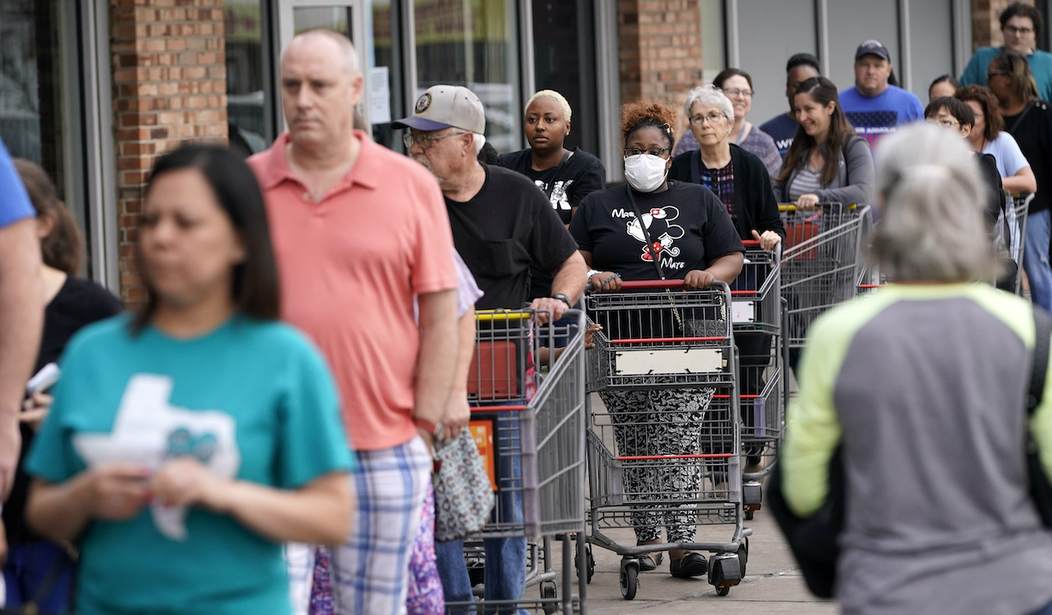WASHINGTON -- In 2020, people talk about "two Americas." During the coronavirus outbreak, there is one America, a sheltered America, with people who -- like me -- can work at home. And another America, an edgier America, that stands to be devastated by coronavirus closures.
There is also a third America that can be seen in the three states hardest hit by the COVID-19 and virtually shut down. In order to keep the rest of America from turning into that third America, sheltered America argues, stringent measures must be imposed on all of America.
To which edgy America responds: If elected officials close up America for one month or two months, what will be left?
When the Centers for Disease Control and Prevention suggested a lid on gatherings of 50 people for eight weeks, Cathy Merrill, owner of Washingtonian Magazine, which employs some 75 people, wrote in The Washington Post that the so-called eight-week "hiatus" could serve as a "death sentence" for her business. While she was working at home, Merrill wondered how many of those setting emergency policy have ever run a small business.
I write this from my dining room table. I showed symptoms for coronavirus and had covered an event attended by someone who later learned he was infected.
I saw a doctor. I'm in home lockdown for two weeks. I don't know if I have COVID-19 because I have not been able to take the test.
There was a lot of blame hurled unfairly at President Donald Trump for the CDC's delays in getting tests where they are needed. The tests now have hit states, and people with symptoms still are waiting.
Recommended
My doctor in Virginia has had tests since Monday, but a lack of protective equipment, general confusion and state protocols prevent him from administering them.
Unexpected kinks happen in a crisis. You fix them and keep going.
If this fight to contain the pandemic is going to work, the test situation has to be fixed quickly. I've been scrupulous about staying at home without knowing if I have COVID-19 because I can report and write at home. But I think it's too much to expect everyone to stay home just in case they are infected -- especially asymptomatic people living paycheck to paycheck or struggling to keep small businesses afloat.
I'm not talking about college kids on spring break, but entrepreneurs, service workers and families in tight spaces.
Which brings to mind Nevada Gov. Steve Sisolak, who last weekend shut down the state's public schools through April 6. Why? The CDC website recommends school closures only when someone with a confirmed infection has been in a school or in districts with community transmission. Even then, the CDC recommends closures for two to five days.
If you go into the state's coronavirus webpage, there's a link to the CDC guidelines. CDC modeling projects no change in the infection curve or hospitalizations after school closures of two to four weeks. And the models predict multiple downsides -- interrupted learning, increased risk for grandparent caretakers, more social mixing outside of school. Not to mention there's no school.
But state's governors were so eager to look as if they were ahead of the curve that more than 30 of them shut down all their schools.
Sisolak could counter that there is a risk, as Heard Elementary School in North Las Vegas reported a Clark County school's first case. It's a sad milestone that would call for school closure and cleanup is already underway. But is it worth the closure of every Nevada public, private and magnet school?
On Tuesday night, Sisolak called for a 30-day closure of "nonessential businesses" -- with little explanation as to why his constituents should stop making money for a month when the president's coronavirus task force is pushing "15 Days to Slow the Spread."
Sisolak spokesman Ryan McInerney said that the chief medical officers of all of Nevada's hospitals advised in favor of a 30-day closure.
Sisolak told Nevadans: "This is affecting the lives of our citizens. People are dying. You know, every day that is delayed here, I'm losing a dozen people on the back end. They're going to die as a result of this."
The inference is that if you question the policy, you want people to die. It took guts then for Las Vegas Mayor Carolyn Goodman to appeal to the governor to shorten his 30-day shutdown because she doesn't want to see Las Vegas choke.
New York Gov. Andrew Cuomo has issued more measured restrictions, such as a mandate that 75% of nonessential workforce work from home. Thursday morning, he tried to quell the panic when he told reporters, "Let's just take a deep breath and make sure we're all acting on facts instead of acting on fear." He added, "The facts we can handle."
My fear is that when governments impose -- not suggest -- closures too soon, and those measures don't stem the tide sufficiently, but they do manage to destroy people's livelihoods, the public will tire of closures if and when more stringent measures are needed.
Contact Debra J. Saunders at dsaunders@reviewjournal.com or 202-662-7391. Follow @DebraJSaunders on Twitter.

























Join the conversation as a VIP Member